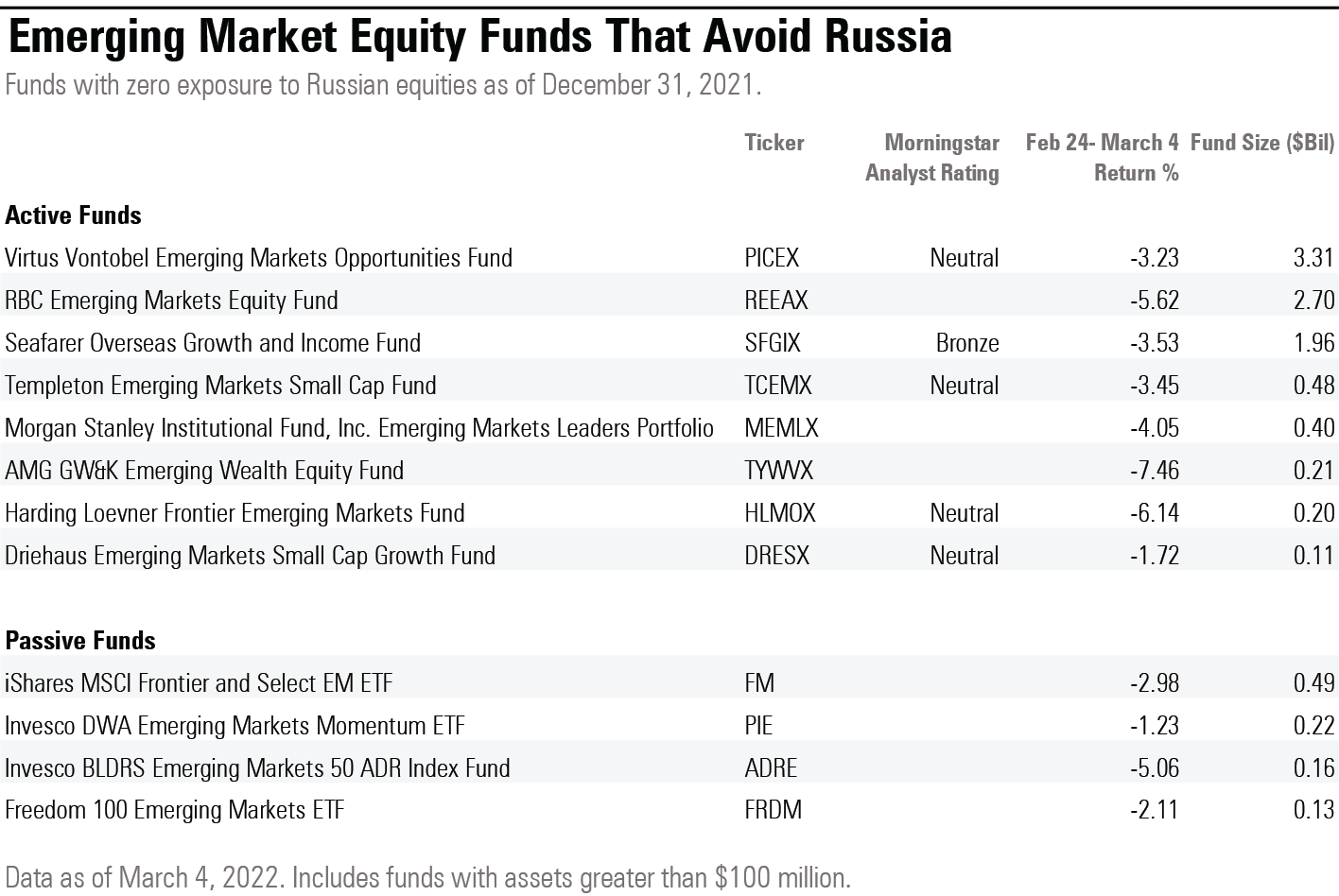Just 8% of Emerging-Markets Funds Miss Russian Collapse
Some funds' processes led them away from Russian companies.
Editor's note: Read the latest on how Russia's invasion of Ukraine is affecting the global economy and what it means for investors.
Emerging market funds that avoided Russia’s stock market plunge did so in many cases due to their own goals and investment philosophies, rather than a stated policy of avoiding a country whose economy is now collapsing following sanctions brought on by the invasion of Ukraine.
Among emerging market funds tracked by Morningstar about 7.6%, or 24 out of 315, didn’t hold shares in companies domiciled in Russia at the end of last year. Of those funds 15 hadn’t invested in the country since March 2019.
Funds with holdings in Russia are down nearly twice as much as those that avoided the country, falling 6.49% versus 3.3%, since the war began. In that time the average fund in the $732 billion category is down 6.24%. On average those funds had about 4.67% of their assets in Russian companies as of Feb. 28.
There are a variety of reasons why funds may be less exposed to Russia. Some emerging market managers search for value in growth or small-cap stocks, which are few in Russia’s energy and basic materials heavy stock market. Other funds may focus on frontier markets or incorporate ESG criteria that naturally leads them away from Russia’s gas and oil focused market.
Seafarer Overseas Growth and Income Fund’s SFGIX investment process led it to stay away from Russian stocks. The managers focus on firms with sustainable growth prospects and reliable income streams, which has led to atypical sector and country weightings, senior manager research analyst William Rocco says. The fund also tends to invest in smaller companies than the average emerging market fund. The average market cap of a company they invest in is $11.3 billion, versus a $58.4 billion average for its peers. That leads them to look for opportunities outside of Russia’s large-cap dominated stock market.
However, the managers don't dismiss the conflict's influence on the fund. In a recent message to shareholders, they discussed second-order impacts that may result from the conflict. They note that 6.25% of its assets could be affected by companies with material business interests in Russia or Ukraine.
Virtus Vontobel Emerging Markets Opportunities PICEX is focused on finding high-quality companies with steady, dependable growth characteristics. Historically, they have been unable to find many companies meeting their criteria in Russia, says Andrew Daniels, associate director of equity strategies.
Morgan Stanley's Institutional Fund Inc. Emerging Markets Leaders Portfolio MEMLX considers ESG criteria in its investment process, according to their prospectus. Morningstar's director of sustainability research Jon Hale wrote in a report dated March 3 that funds with a focus on ESG may avoid Russia, since many public companies there have high levels of risk, particularly those in the fossil fuel industry, which comprises about half of the country's market capitalization.
The Freedom 100 Emerging Markets ETF FRDM index most explicitly excludes Russia. It is composed of companies based in countries that rank high on certain personal and economic freedom metrics. That keeps them from investing in Russia and several other countries, including China and Saudi Arabia, founder Perth Tolle said in an interview.
Frontier funds, a subset of emerging markets, invest in smaller countries like Vietnam and Lithuania. And among passive funds, Invesco DWA Emerging Markets Momentum ETF’s PIE focuses on technology companies, which are sparse in the Russian economy. The Invesco BLDRS Emerging Markets 50 ADR Index Fund ADRE invests in the largest emerging market ADRs, also known as American depository receipts, which are the U.S. shares of companies based overseas. That mostly involves technology companies domiciled in China.


/s3.amazonaws.com/arc-authors/morningstar/8b2e267c-9b75-4539-a610-dd2b6ed6064a.jpg)

